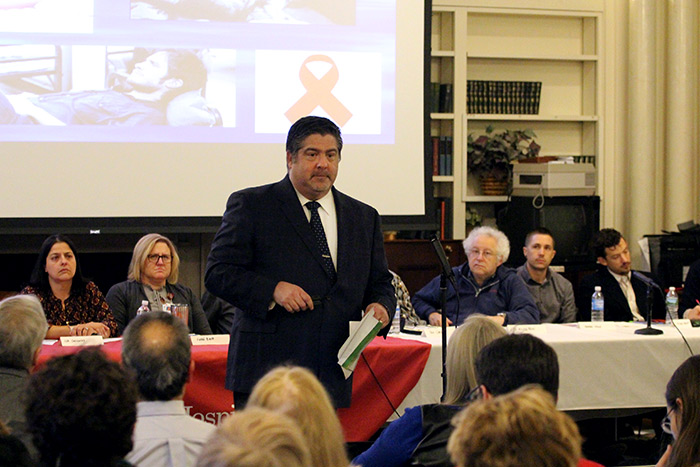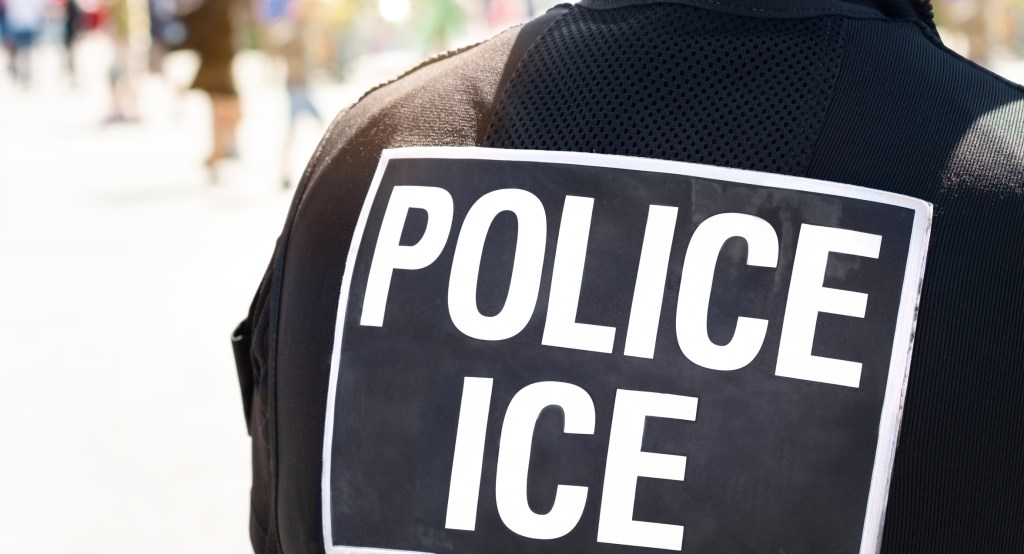Southampton Opioid Task Force Seeks Solutions as Death Toll Rises

The Southampton Opioid Addiction Task Force met with local medical professionals and other interested community members to discuss treatment issues and solutions at Stony Brook Southampton Hospital on Thursday, February 8. Before a packed house in Parrish Hall, a panel of experts answered questions and offered thoughts on the problem following a presentation by the hospital’s Chief Academic Officer and addiction medicine specialist Dr. Shawn Cannon.
Painting a grim picture of America’s opioid crisis and the havoc it’s caused locally, Cannon drove home the point that addiction treatment is not getting enough attention or proactive intervention from health insurance companies and the medical establishment at large. “This is everyone’s problem,” Cannon said after rattling off a litany of disturbing figures, including the fact that, despite only representing 4.6% of the world’s population, the United States consumes 84% of all prescription opiates, such as Percocet, Vicodin, OxyContin and the extremely deadly Fentanyl. “We need our resources to be utilized to their fullest potential.”
NEED HELP? Click Here for a List of Local Resources and Treatment Options
The doctor, who manages Stony Brook Southampton Hospital’s interns, said his students receive no addiction medicine training in medical school, and that needs to change. Additionally, Cannon said health insurance companies rarely give patients enough coverage for legitimate treatment at inpatient rehab facilities. If they even have beds available, some give as little as three days, which is not enough time for an addict to detox from opiates, let alone establish new behavior patterns and time away from the people, places and things that will inevitably steer them back to active use. Three days of treatment is not enough to cure a lifetime of addiction, he explained.
As evidenced by Thursday’s meeting, addiction is clearly starting to get more attention, but that’s greatly due to the skyrocketing death toll—over 60,000 overdose deaths nationwide in 2016 and an estimated 400 deaths in Suffolk County last year—which is impossible to ignore. Still, many remain loath to talk about the problem, Cannon said, comparing this attitude to the way people stayed silent about breast cancer and AIDS in past decades. Now, he said, there’s a breast cancer fundraiser every weekend out here from Memorial Day to Labor Day, and AIDS, too, is getting attention and funding.
“Time to start talking about it…I don’t care who you are,” Cannon said of the addiction crisis. “We have to change the attitude of ‘not in my backyard,” he continued. “It is in your backyard.”
Opioid Addiction Task Force Co-Chair and Southampton Town Supervisor Jay Schneiderman said Southampton, a community of just 60,000 people, had an average of more than one opioid-related death a month in 2017. But the 44-member task force and other initiatives—with coordination between local officials, police, hospital personnel and area pharmacies—could have some positive results. “Our goal is to prevent that next death,” Schneiderman said. “We’re trying to make this circle as big as possible,” he adding, noting this is a community effort.
Among those positive changes, Southrifty Drugs owner and task force member Bob Grisnik said his pharmacy was the country’s first to amend its license to be a collector of drugs as well as a dispenser. As Cannon said earlier, young people are often first exposed to opiates by finding them in their parents’ medicine cabinets. “We take them and have them incinerated,” Grisnik said, explaining that pharmaceuticals should not be thrown in the trash because drugs end up contaminating the ground water.
Another prominent task force member, Southampton Town Police Department Chief Steven Skrynecki, said his officers are now trained to administer Narcan to overdose victims. They’ve also begun a new program where police follow up at the home of anyone admitted to the hospital for an overdose, whether they survive or not. It’s an imperfect system because HIPA laws require consent, but the idea is to try turning the addicted toward treatment during this critical time, instead of simply returning to opiate use.
“We have a long way to go for sure,” Dr. Cannon said, but “It comes down to a society saying we need to address this problem.”
The Southampton Opioid Addiction Task Force comprises members from all walks of life, including doctors, social workers, local government officials, counselors, school superintendents, representatives from area rehab facilities, clergy and more. They meet once a month.
Learn more at southamptontownny.gov.









